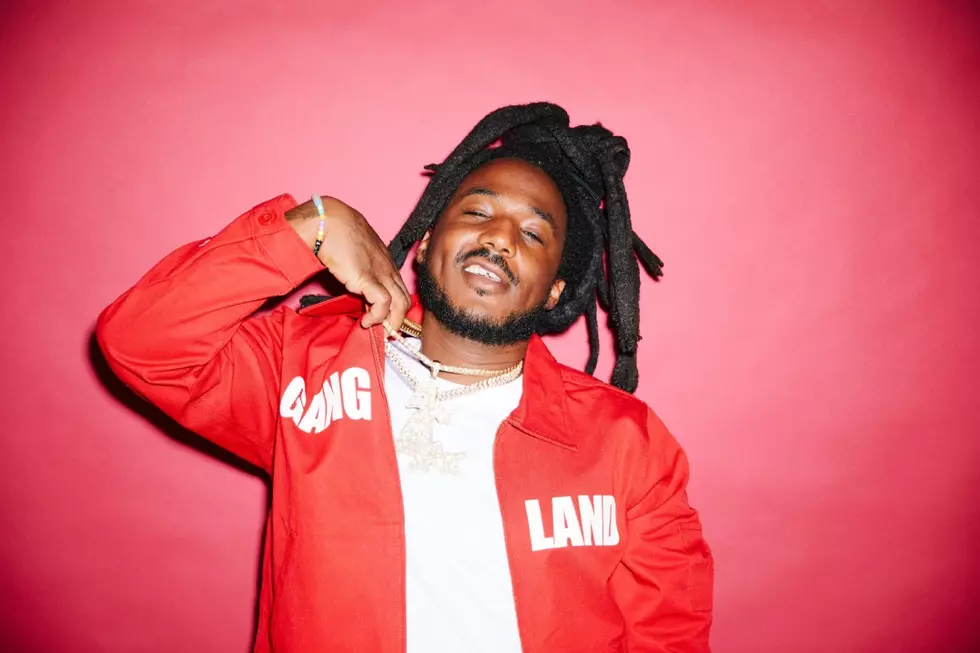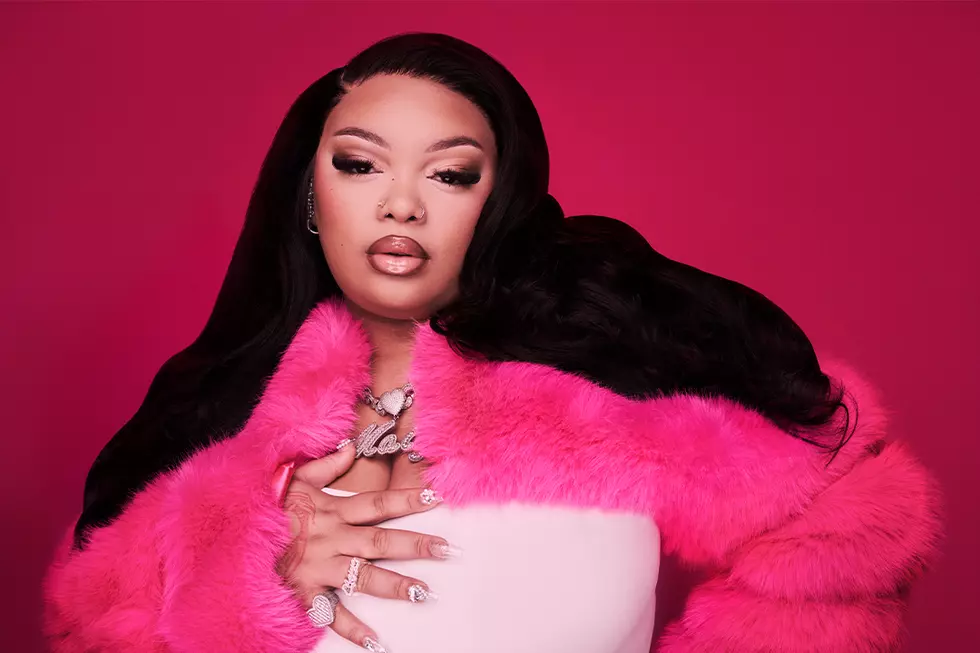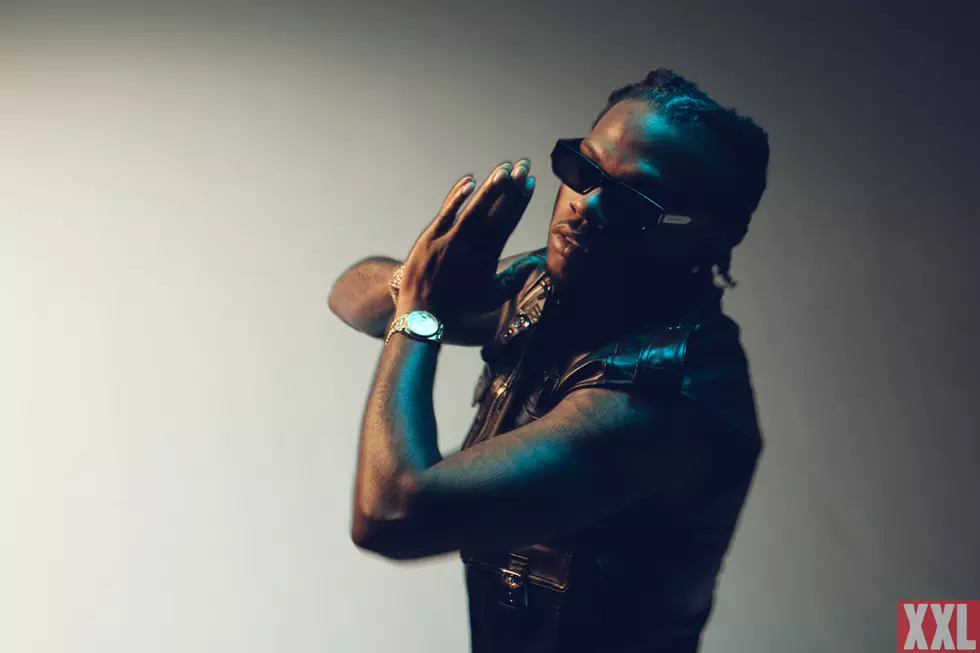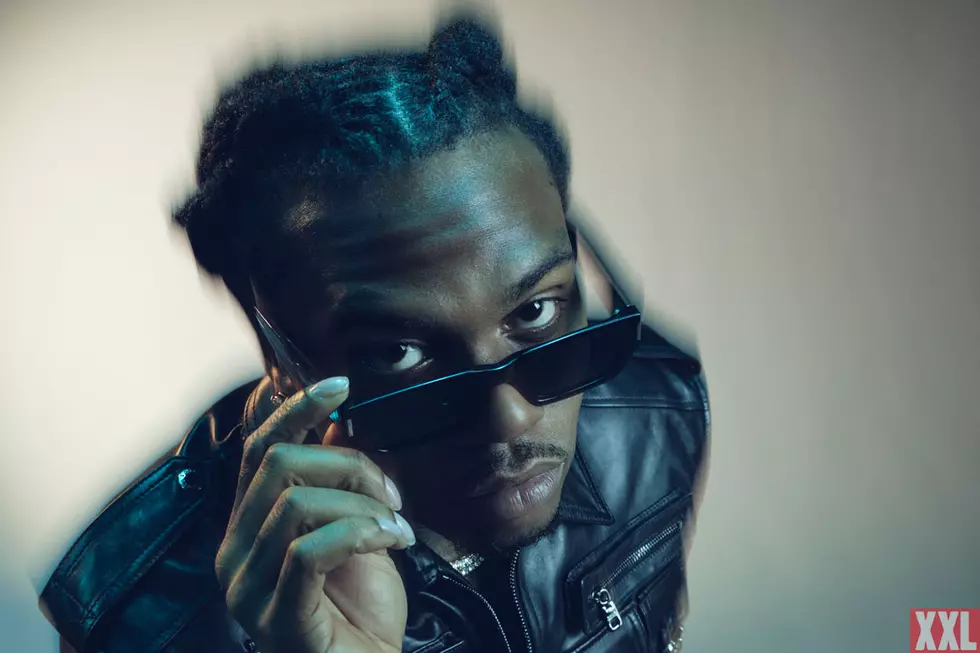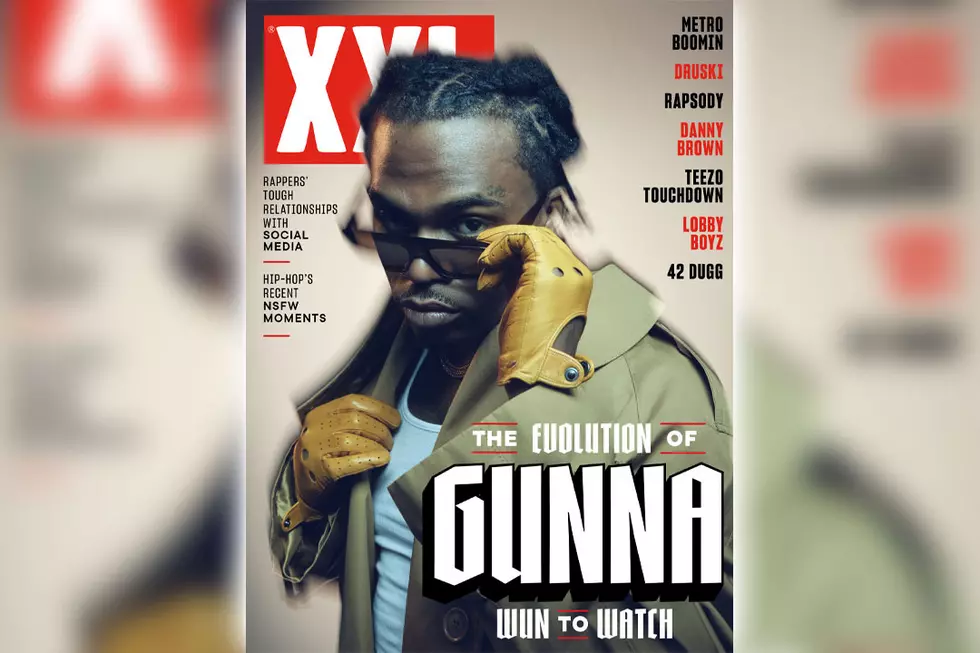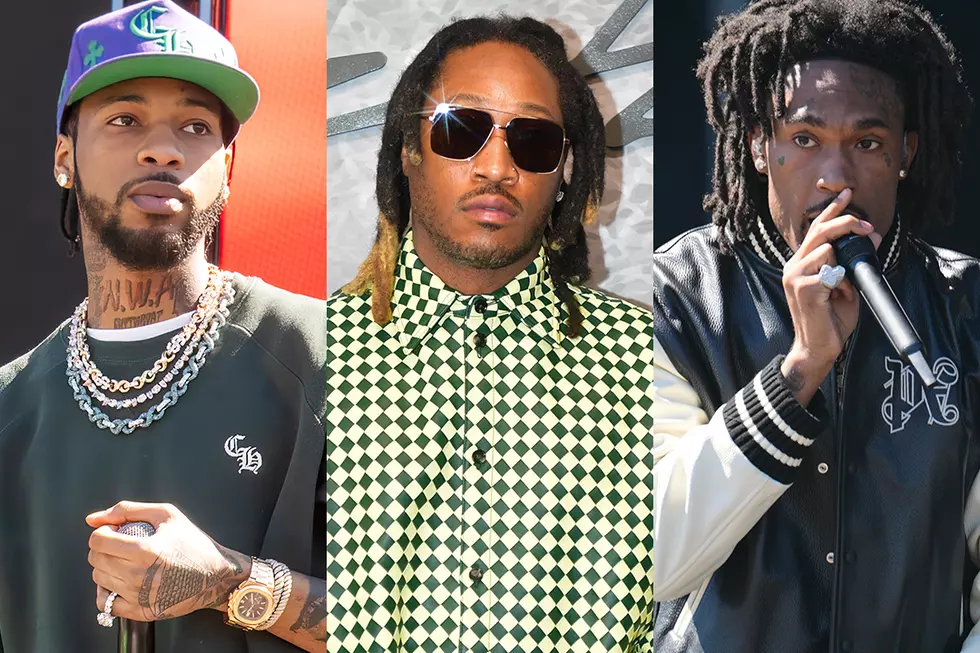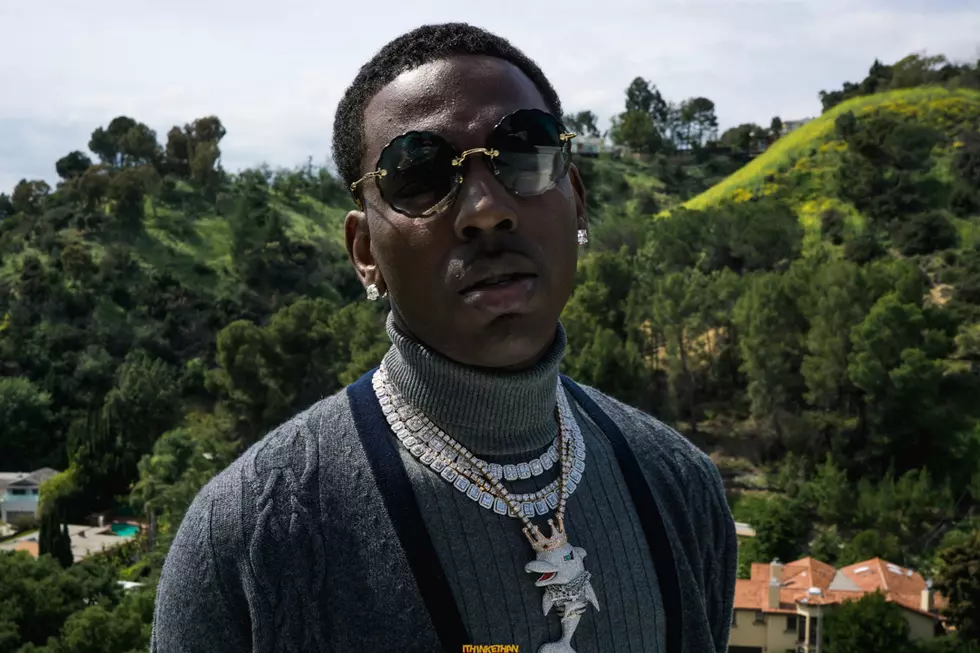
How Young Dolph Bounced Back From Beef to Become an Indie Rap King
I'm a Boss
After the controversies and beefs that have plagued Young Dolph’s career, the Memphis rapper is ready to drown out the noise with good music.
Words: Jewel Wicker
Editor’s Note: This story originally appeared in the Summer 2019 issue of XXL Magazine, on stands now.
On a Wednesday afternoon in May, Young Dolph pulls up to Tree Sound Studios just outside of Atlanta in a camouflage Rolls-Royce, wearing a matching camo shirt, blue jeans that are frayed at the knees and an Oakland Raiders hat turned backwards. Holding stacked styrofoam cups and a bottle of pure apple cranberry juice, the tall, lanky rapper walks past the studio’s lounge area into a small room where his engineer and publicist are waiting to begin a session. He leans up against a table and takes a sip from his cup. Speaking very few words, he motions for his engineer to hand him an aux cord. For the next half hour, the rapper faces forward, scrolling through his phone and skipping through a variety of unreleased songs.
After playing three new records, he lands on “Juicy,” a safe bet for a future strip club anthem. Over stuttering hi-hats and melodic synths, Dolph repeats the track’s title throughout the hook before rapping, “When she walk, all you see is ass moving/I think she got me sprung, she so damn juicy.” He’ll run through about 10 songs in total, stopping every two or three songs and looking towards his publicist. “Which one was your favorite?” the 33-year-old rapper asks. When his PR person mentions “Juicy,” Dolph raises an eyebrow, surprised, then plays the track again. “I couldn’t tell if I think it’s hard because I made a girl song or if it’s really hard,” he says.
Studio sessions like this are routine for Dolph. After today, he’ll travel to New York for a few days, then spend a few weeks in Los Angeles. He’ll come back to Atlanta briefly to shoot a music video and perform in Alabama. But in every city, he finds a studio to record in. The hustler mentality has helped Young Dolph position himself as one of the most prolific Southern rappers of the last decade, garnering fans for his authentic lyrics of trap life, as well as his unique, brazen delivery. The Memphis rapper is known for releasing at least one project each year, but this summer he intends to drop two: a solo album and a joint album with Key Glock—a signee to his label, Paper Route Empire. According to the Memphis rapper’s co-manager, Jeremel “Daddyo” Moore, Dolph has been on a creative high lately, recording five to six songs per day. “Somebody’s working if I ain’t working,” Dolph remarks.
For Dolph, his dedication to outworking his peers has allowed him to remain in control of his career’s trajectory. His insistence on independence—and him implying that he’s turned down major-label deals worth as much as $22 million—is a significant part of the rapper’s appeal. Throughout the years, though, his beefs with other rappers and the multiple attempts on his life have garnered just as much attention as his talent and drive. Still, despite previous smoke with fellow hometown rappers Yo Gotti and Blac Youngsta, the self-proclaimed “King of Memphis” is at a place in his career where he feels “blessed.” “[We’re] having fun, doing music and just living life,” says Dolph.
* * *
Young Dolph wasn’t raised to measure his success based on traditional goal markers. Perhaps this has allowed him to find his own way in the music industry. “My dad used to always tell me when we [were] little, like real little, ‘I’m rich,’” he recalls. “I’m knowing we fucked up. But he [telling] me, ‘I’m rich. It ain’t about money. I’m rich in spirit. I got a job, got my kids.’ It’s like, shit, he wasn’t complaining. It is what it is and he was dealing with it. [My parents] always kept me grounded.”
Adolph Thornton Jr. was born in Chicago to parents who were addicted to crack cocaine. His childhood was filled with love but also hardships and violence. At an early age, he saw things that would be hard for any child to process, including a drive-by shooting outside of his home when he was 9. Dolph’s grandmother raised him and his two brothers, moving them to Memphis shortly thereafter (his two sisters stayed behind in Chicago with their other grandmother).
For much of his youth, Dolph harbored a resentment for his parents, a theme he’d eventually grapple with in his music. His grandmother was a steadying presence in his life, though. He appreciates them now, but Dolph clashed with the rules that were laid out for him during his childhood. “I didn’t agree with everything she was trying to get me to do and teach me, but once I got old enough, I understood everything,” he says of his grandmother’s disciplining. “I’m thinking she was being mean. I’m like, ‘Damn, I just want to have fun. I just want to go outside, Grandma, play with the rest of the kids and kick it and ride bikes.’ She prepared me for life with all of the rules.”
By the time he enrolled in high school, Dolph began hustling, providing for most of his family. Growing up in an impoverished neighborhood in South Memphis, hustling wasn’t about excess; it was about survival. On 2013’s “South Memphis,” Dolph raps, “Robbin’, pimpin’ and sellin’ dope, that’s that South Memphis shit.” Dolph didn’t attend prom but upon seeing the effort his grandmother had gone through to celebrate his impending graduation, he pushed through and finished high school. When his grandmother died in 2008, it further fueled Dolph’s drive to take care of his family. It was around this time, when Dolph was in his early 20s, that he began to take rap seriously. Before then it was only something he’d done for fun, along with playing basketball and drawing. “One day he just said, ‘I’m going to start rapping,’” says Daddyo, Dolph’s business partner and friend for more than two decades. Dolph’s cousin, known to fans as Sleepy Cuz, remembers when Dolph recorded his first song (“That shit was hard,” he reflects). Still, he didn’t expect Dolph’s budding interest in music to be as fruitful as it’s been.
Before this time, Dolph says he hadn’t considered being a rapper, although he’d long been a fan of Southern acts, specifically ones from legendary New Orleans collectives like Cash Money Records and No Limit Records (an interest that likely played into his eventual desire to be an independent artist with his own label.) “Seeing them, it made you feel like, Oh, I can do that shit,” he says. “So, that’s what I did.”
In 2009, Young Dolph released his debut mixtape, Paper Route Campaign, and began making waves in his hometown. On the debut, Gucci Mane’s influence on the rapper is apparent, but Dolph’s signature deep voice is hidden behind synth-heavy beats. His knack for melodies and trap lyrics were evident even back then. By the time he launched his High Class Street Music mixtape series in 2011, he’d begun to make waves outside of Memphis. In 2014, the rapper said he was offered a record deal by fellow Memphis rapper Yo Gotti. As a result of Dolph’s intent to blow up independently, he declined the deal. He found success on his own terms shortly thereafter, being featured on songs like O.T. Genasis’ “Cut It” in 2015 before dropping his single “Get Paid” in 2016. Yet Dolph has long said his decision not to sign with Gotti’s CMG label resulted in an ongoing beef between him and Yo Gotti.
Following rumors that tension had been brewing between the two, Dolph released his debut album, King of Memphis—a title that Gotti had long claimed as his own—in 2016. The beef came to a head when the two rappers began releasing diss tracks. Dolph’s controversial “Play Wit Yo Bitch” (which has been criticized for its homophobic lyrics) came first, followed by Gotti’s “Don’t Beef With Me.”
In 2017, Dolph was involved in two shootings. While in Charlotte for the CIAA college basketball tournament, Dolph’s bulletproof SUV was shot at dozens of times. Young Dolph opened up about the incident on the incendiary 2017 track “100 Shots,” but police have said the titular number is an exaggeration. Shortly afterward, Blac Youngsta, who is signed to Gotti’s CMG label and also exchanged diss songs with Dolph, was charged with five counts of discharging a weapon into an occupied dwelling/moving vehicle and one count of conspiracy to commit discharging a firearm into an occupied dwelling. (The charges were recently dropped.) Months later, Dolph was shot in his arm and buttocks while in Hollywood. Early reports listed Yo Gotti as a “person of interest” in the shooting, but LAPD subsequently said those reports were inaccurate. Today, Dolph wants to put all of that behind him, declining to field questions on the rivalry.
Young Dolph’s lyrics have always been about more than beefs. His early projects focus on hustling and his upbringing. Notably, he addresses his parents’ addiction and the impact it had on his life on songs like 2016’s “Rich Crack Baby” and 2018’s “Black Queen.” In his neighborhood, addiction was common. Dolph says this prevalence is why he’s been forthright about sharing his own story. Whereas the rapper has long been honest about the resentment he once harbored for his parents, “Black Queen” finds Dolph paying homage to them in spite of their shortcomings. “[Growing up], everybody knows your parents and where you come from anyway; it ain’t no secret,” he says. “They’re the reason I am what I am.”
Young Dolph’s lyrics have always been about more than beefs. His early projects focus on hustling and his upbringing. Notably, he addresses his parents’ addiction and the impact it had on his life on songs like 2016’s “Rich Crack Baby” and 2018’s “Black Queen.” In his neighborhood, addiction was common. Dolph says this prevalence is why he’s been forthright about sharing his own story. Whereas the rapper has long been honest about the resentment he once harbored for his parents, “Black Queen” finds Dolph paying homage to them in spite of their shortcomings. “[Growing up], everybody knows your parents and where you come from anyway; it ain’t no secret,” he says. “They’re the reason I am what I am.”
Young Dolph’s willingness to discuss even his most traumatic experiences over a beat has helped him carve out a reputation as someone who is authentic. This, coupled with his insistence on remaining independent, has been the basis of his career. Yet in January of this year, the rapper posted a series of now-deleted tweets suggesting his public image as an independent artist had been a facade. “The record label been bushittin. They want let me drop any new music. I KNEW I SHOULDVE NEVER SIGNED THIS FUKIN DEAL,” he tweeted, claiming he’d signed a deal in 2015, followed by two more in 2018. When asked about this at Tree Sound, the rapper doesn’t take his focus off the cigarillo in front of him. “I was just bullshitting,” he says, dumping tobacco onto the studio table. “I told my boy, ‘Watch this real quick.’ We were smoking a blunt. I put this shit up there and I was like, the real Dolph fans are going to know that this shit is some bullshit.” The rapper said he was just in the mood to have some fun and, even after seeing all of the tweets and discussions he’d garnered, he never felt the need to clarify his comments. If you know, you know.
Regardless, Dolph, who has a distribution deal with Empire, claims he’s still fully independent. He says it’s a blessing to own his own label, as he can assert control over his own career while helping to launch other artists. For Dolph, his bond with his signees goes beyond the music. “Really, the music I could give a damn about because that’s the easiest part,” he says. “I got to be into the person to even want to push their music.”
Key Glock certainly has the skills and gall to hang with Dolph. Less than a month after he was arrested on firearm and marijuana charges in May, Glock (Dolph’s cousin by marriage) released the music video for “Spazzin Out.” The visual, which racked up 2 million views in its first week, features media coverage of the arrest and the rapper’s smiley mugshot. “He’s hungry,” Dolph says of Key Glock. “He feels like he got a point to prove and I like it.”
Glock says he and Dolph weren’t planning to record the joint project set to arrive this summer. It just sort of happened. “We were really just having fun in the studio,” he says, adding that fans have long wanted the two to collaborate more. “At the end of the day, we’re family. We gon’ provide for each other and look out for each other.” Dolph doesn’t just provide for his friends and family, though. To his fans, the rapper is as charitable as he is controversial to critics. Last year, when two baristas were fired for rapping along to Dolph’s song “Get Paid” while on the clock, he gave them $10,000 each. He held a social media challenge earlier this year in support of his single “Major” and gave the winning fan $30,000. “He’s been giving stuff away way before he was even rapping,” Sleep Cuz says. “He been giving folks cars, money and helping them with bills.” Still, most accounts of Dolph have been one-dimensional. “You wouldn’t think he’s as smart as he is,” says Dolph’s co-manager Allen Parks of Street Execs. “At the end of the day, it’s just pure intelligence. It’s my goal, as well as his, to change the narrative.”
* * *
Inside Tree Sound, Young Dolph is slowly switching between unreleased songs on his phone, as if he’s reminding himself of all the content he’s recorded recently. On one of the songs, which features extraterrestrial sounds, echoed synths and a thudding bassline, Dolph raps about taking his trap money and buying his way into heaven. For the most part, the beats and the lyrics (“Love get you killed, hustling gets you mil(lions),” he raps on one song) are signature Dolph. Since his early days, the artist has relied less on the minimal beats he raps over and more on his unique voice delivering tales of the Memphis trap. But there are a few tracks that find the rapper stepping outside his comfort zone, including the aforementioned “Juicy.” On an untitled song he’s earmarked as an upcoming single, Dolph adopts Migos’ signature cadence, rapping, “I call my G-Wagon Soulja Boy, you gotta crank it.”
“They say James Brown was the hardest working man in show business—I don’t believe it,” Sleepy Cuz says. “I ain’t never seen nothing like [Dolph’s work ethic] in my life.” Still, he knows when it’s time to unplug. “The music and all that shit, it gets tiring,” Dolph says, adding that he often vacations to spend time with family. “You get to feeling like a robot, like, I got to do this, got to go here, do this with everybody.”
At the moment, Young Dolph shows no signs of burnout. Daddyo feels Dolph and Paper Route are poised to make some bold strides in the near future. “We live life and we have [had] some bumps in the road,” he says, “but now the road feels like it’s smooth,” Dolph insists he plans to make his next move his best move. “Every decision you make, you got to stand on that decision,” he tells. “Whatever you doing with your career, with your personal life, that shit got to be worth it. Because everybody wants to be rich. But what [are] you doing with your time? Whatever you want to do, just make solid decisions. Like when you play chess. Keep moving [pieces] that way until you get crowned.”
Check out more from XXL’s Summer 2019 issue, including our 2019 XXL Freshman cover story interviews and report about whether Jay-Z should run for political office.
See 10 Rappers’ Purchases That Broke the Bank
More From XXL

